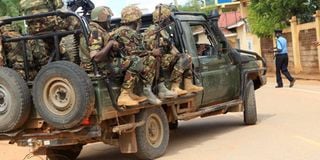Mandera in tight spot as Somalia's unease spills over

KDF troops in Mandera town last April.
What you need to know:
- For the second month in a row, Al-Qaeda linked terror group, Al-Shabaab, has continued to carry out attacks targeting security agencies, civil servants and telecommunication masts.
- Early in January, Mandera Governor Ali Roba warned that a serious security crisis is unfolding in the county due to undeterred operations by the terror group.
Mandera’s residents find themselves between a hard place and a rock following sustained terror activities in the far-flung county.
For the second month in a row, Al-Qaeda linked terror group, Al-Shabaab, has continued to carry out attacks targeting security agencies, civil servants and telecommunication masts.
On Wednesday afternoon, a senior Kenya Defence Forces (KDF) officer was killed and two of his colleagues injured when their vehicle was hit by an explosive device at Omar Jillo along Mandera- Lafey- Elwak road.
Early in 2015, the national government declared this road closed to public use after a Nairobi-bound bus was hijacked and at least 28 people killed.
Since then, however, Al-Shabaab has continued to plant explosives and carry out attacks on the same road and its surroundings, including abductions, shootings and raids on villages.
Within Mandera County, the militants have operated in Mandera East, Lafey, Elwak and Kutolo and recently spread their criminal activities to the interior parts of Banisa, Rhamu and Takaba.
“Al-Shabaab gained access to the interior parts of Mandera because of corruption among security officers and laxity,” said Mr Ali Gabow, a resident of Mandera.
Mr Gabow claimed senior security officers in the county have been collecting bribes through their juniors and letting the terrorists move into new areas.
“Quarrying was stopped by the national government but in parts such as Bur Abor and Jirma, miners are at work. How come they are working? Government officers who are fully aware of the closure?”
Mr Gabow claims the government officers have struck a deal with quarry owners on how to share the resources, letting Al-Shabaab also get their share in terms of Zakat (offering).
“Al-Shabaab collects taxes at will from quarry operations. Government officers are part of this arrangement. They are also benefiting ,” he said.
Senior government officers in Mandera denied the allegation.
Governor’s warning
Early in January, Mandera Governor Ali Roba warned that a serious security crisis is unfolding in the county due to undeterred operations by the terror group.
Mr Roba maintained that residents share actionable intelligence with security authorities but County Commissioner Onesmus Kyatha denied this and accused them of collaborating with the enemy.
“The claims by the governor are untrue. Some elements are collaborating with Al-Shabaab by harbouring them and even providing them with food,” he said.
It was on January 8 that Governor Roba raised the alarm on the return of the militant group in the county.
He claimed the militants control more than a half of the county and man the county’s roads.
The State dismissed the claims but the spat between Governor Roba and State agencies in Mandera was followed by a series of attacks including an ambush at Banisa on January 11, on a bus heading to Nairobi.
Three people were kidnapped on the same day after their vehicle was hit by an explosive along Banisa Takaba road. The three were found alive after a week.
On January 12, a bus operating between Mandera and Nairobi was stopped by a group of Al-Shabaab militants immediately after entering Wajir County.
The bus conductor lost Sh40,000 to the militants while the travellers lost some of their belongings.
The group said it was looking for non-locals on board.
Communication lines
On January 13, a telecommunication mast at Darkale was vandalised and on the following day, the same group attempted to vandalise another mast at Didkuro in Mandera West.
At Didkuro, security officers responded on time, preventing the destruction of the communication mast.
On January 15, police on patrol in Banisa battled militants at a water point in Wako Dadacha village, a confrontation which left a civilian dead and another injured.
A security brief indicated the militants used herders as shields and managed to escaped.
On January 19, suspected militants bombed a telecommunication mast at Sarman in Mandera North Constituency.
The goal between these attacks remains unclear but a local said they could be planning more serious attacks.
“They want to ensure no communication before carrying out more serious attacks, including butchering people,” Mr Ali Hassan said, adding the worry is that with the communication network cut off, the terrorists will operate in Mandera at will.
On January 20, police officers in the Elramu Anti-Stock Theft Unit (ASTU), supported by the military, foiled an attempted attack on their camp.
On January 24, a special group from the military gunned down a militant at Ali Wol dam in Ashabito.Three militants were injured in the incident.
Other factors
Following the frequent attacks in Mandera, the education sector has suffered the most.
At least 126 schools have a local teacher in charge as the majority of non-local teachers abandoned the county over insecurity.
The presence of Jubbaland forces in the county has also contributed to the insecurity.
Jubbaland forces clashed with the Somalia National Army on Monday, bringing business to a standstill in Mandera town that neighbours Bula Hawa, the battleground.
Unconfirmed reports indicate that the foreign forces are reassembling at their camp within Mandera.
The two camps clashed for the first time in March last year forcing the Jubbaland forces to seek refuge in Kenya.
Mr Hassan Ali, a resident, said, “Having a foreign military camp in Mandera remains a threat to our security because every time they go to war, our lives are affected.”





